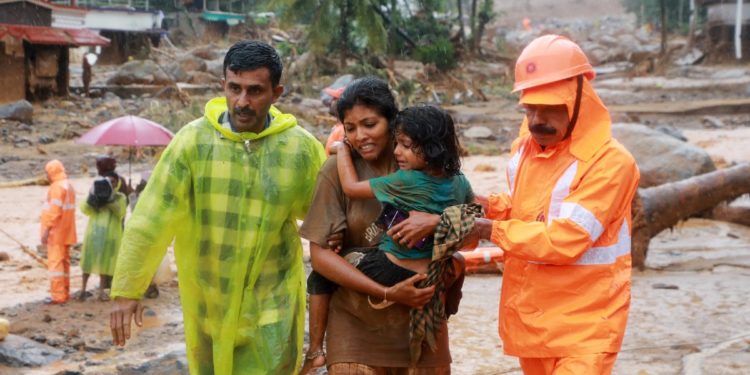NEW YORK TIMES
More than 80 people were killed and dozens more injured in the southern Indian state of Kerala after days of heavy rainfall set off multiple landslides in an area known for a rugged, natural beauty that is a big draw for tourists.
The landslides in the district of Wayanad uprooted trees, knocked down communication lines, submerged roads and washed away a bridge. Rescue operations were hindered by the region’s hilly terrain, which made it harder to reach around 600 residents of the three villages that were worst hit.
“We are fighting nature at its worst,” said Akhilesh Kumar, an official with India’s National Disaster Response Forces who was overseeing the rescue operation along with the Indian Army and firefighters. Government officials said the death toll would most likely rise, and it could take days to rescue those trapped and buried under debris. More than 116 people suffered from injuries and were being treated at local hospitals.
Landslides triggered by heavy rains and flooding are common in India and other South Asian countries during the monsoon season, which runs from June to September. The rains, which are crucial for millions of farmers, often cause widespread damage.
Kerala is especially prone to landslides. The state recorded the highest number of landslides in India for the seven years ending in 2022, according to a government official at the time.
Indian Prime Minister Narendra Modi assured the local authorities that the federal government would provide all possible assistance. “My thoughts are with all those who have lost their loved ones and prayers with those injured,” Mr. Modi said in a post on X.
Rahul Gandhi, the leader of India’s opposition, had previously represented Wayanad district in the Lok Sabha, or lower house of Parliament. He said on X that he was deeply anguished and that the “devastation unfolding in Wayanad is heartbreaking.”
Late on Tuesday afternoon, the state government declared a two-day mourning period, and said all public functions and celebrations have been postponed.
Extreme weather events leading to more frequent rains, combined with Kerala’s topography, have only exacerbated its problems, according to experts. In recent years, cyclones, severe flooding and torrential downpours have eroded more than 1,200 acres of its coastal land, displacing thousands of people.


